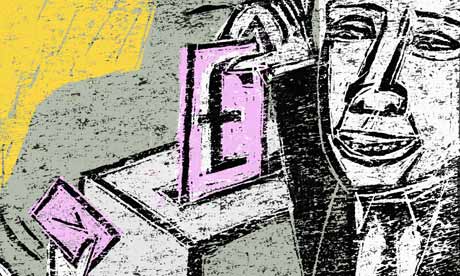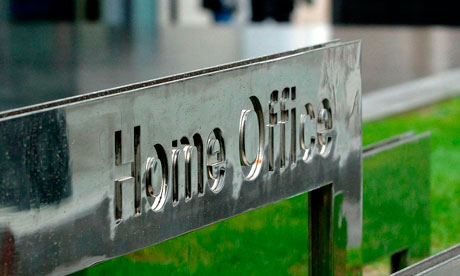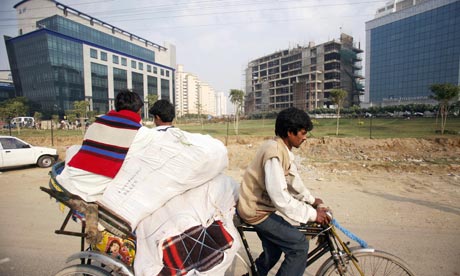By Chan Akya in Asia Times Online
Warren Buffett, besides being the Sage of Omaha and one of the wealthiest men to ever walk this planet, is also an American hero. A man who popularized the notion of investing your savings prudently, taking a knife to Wall Street excesses and more recently, the architect of an effective minimum tax for rich Americans. All in all, your regular billionaire next door.
Of course I can also recount all the reasons why anyone who bothered to print this article and read the first paragraph got disgusted, crumpled the paper into a little ball and threw it into the nearest waste bin.
You know, stuff like his holdings in major American scams like Moody's which he purchased due to the massive profits they were making from selling fake triple-A ratings all around. Or his rescue of such amazing firms as Goldman Sachs in the midst of the financial crisis, in effect protecting them not so much from aggressive market speculators but perhaps the major regulatory bodies as well (Mr Buffett is a known supporter of and donor to President Barack Obama).
Even that supposed act of folksy good humor ("my secretary pays a higher tax rate than I do") hides an ugly word: "legacy". Mr Buffett is old and if he had wanted to pay higher taxes, well he had the last 60 years in which to do it.
But I don't care about any of Mr Buffett's flaws any more than I lose sleep over that stupid woman who unfailingly puts mayonnaise on my sandwich despite being told not to every day. My getting upset doesn't change a thing, and just ends up spoiling my day: it's easier for me to just buy my sandwiches somewhere else. That's where I left Mr Buffett - that is, until his latest investment letter hit the web and through acts of generosity by my friends, made it into my inbox. Ten times over.
Cold on gold
I don't know why so many of them did that - but it may have something to do with his statements about irrational choices that investor make about assets. He writes:
The major asset in this category is gold, currently a huge favorite of investors who fear almost all other assets, especially paper money (of whose value, as noted, they are right to be fearful). Gold, however, has two significant shortcomings, being neither of much use nor procreative. True, gold has some industrial and decorative utility, but the demand for these purposes is both limited and incapable of soaking up new production. Meanwhile, if you own one ounce of gold for an eternity, you will still own one ounce at its end.Okay, so if I understand this right, Mr Buffett objects to the fact that gold cannot be manipulated, conjured up out of thin air and that it draws a bunch of people weary of Keynesian money printing into its fold. I am not going to suggest that Mr Buffett is thick or something, but isn't all of the above the very point about owning a store of value in the first place?
What motivates most gold purchasers is their belief that the ranks of the fearful will grow. During the past decade that belief has proved correct. Beyond that, the rising price has on its own generated additional buying enthusiasm, attracting purchasers who see the rise as validating an investment thesis. As "bandwagon" investors join any party, they create their own truth - for a while.
I don't know about you, but if I could travel through the centuries I would sure as hell like to have in my pocket something that would still be worth something in purchasing power that approaches its current value.
Imagine the following scenario: your grandfather leaves us some wealth but you only get it 50 years later. Now, what would you have liked that "wealth" to have been: cash in US dollars or gold coins? Of course other assets would have worked better - "shares in Apple" for example. Then again, if your grandfather had given you shares in Apple and you got them in 1998, your general feelings of gratitude towards him would have been a somewhat dimmer.
Then Mr Buffett goes on with his diatribe:
Today the world's gold stock is about 170,000 metric tons. If all of this gold were melded together, it would form a cube of about 68 feet per side. (Picture it fitting comfortably within a baseball infield.) At $1,750 per ounce - gold's price as I write this - its value would be $9.6 trillion. Call this cube pile A. Let's now create a pile B costing an equal amount. For that, we could buy all US cropland (400 million acres with output of about $200 billion annually), plus 16 Exxon Mobils (the world's most profitable company, one earning more than $40 billion annually). After these purchases, we would have about $1 trillion left over for walking-around money (no sense feeling strapped after this buying binge). Can you imagine an investor with $9.6 trillion selecting pile A over pile B?Yup, valid points there. Then, again Mr Buffett, I wonder how those farmers would pay for the oil to use in their harvesters and how those oil workers would pay for all the grains they would need to eat. Would they own shares in each other and pay the other party dividends in kind? Or would they transact with a common currency, like gold?
... A century from now the 400 million acres of farmland will have produced staggering amounts of corn, wheat, cotton, and other crops - and will continue to produce that valuable bounty, whatever the currency may be. Exxon Mobil will probably have delivered trillions of dollars in dividends to its owners and will also hold assets worth many more trillions (and, remember, you get 16 Exxons). The 170,000 tons of gold will be unchanged in size and still incapable of producing anything. You can fondle the cube, but it will not respond.
And all the analysis misses the point about corporate fraud, that uniquely American preoccupation that has seen many a top firm go completely bust because of financial and accounting shenanigans. If Mr Buffett had mentioned BP instead of Exxon (and written this article two years ago rather than now) he would have had egg on his face. (See also "BP, Bhopal and Karma", Asia Times Online, June 19, 2010, one of my past articles on the subject of corporate responsibility.
Mr Buffett misses the point entirely about what gold is and what it is supposed to do. In a world where investors have ample reason to lose faith in governments and the financial system, the position of a common store of value that is recognizable and usable across all humanity and is itself beyond religion and politics in terms of being manipulated around (besides being no mean feat by itself) is made stronger, not weaker.
That is not to say that I am recommending you folks to buy gold and nothing else; my view has always been that a building up a little hedge for your financial assets with physical gold is no bad thing. I don't speculate in gold nor do I believe you should.
Of course, he clarifies similar points later on his spiel as follows:
My own preference - and you knew this was coming - is our third category: investment in productive assets, whether businesses, farms, or real estate. Ideally, these assets should have the ability in inflationary times to deliver output that will retain its purchasing-power value while requiring a minimum of new capital investment. Farms, real estate, and many businesses such as Coca-Cola, IBM and our own See's Candy meet that double-barreled test. Certain other companies - think of our regulated utilities, for example - fail it because inflation places heavy capital requirements on them. To earn more, their owners must invest more. Even so, these investments will remain superior to nonproductive or currency-based assets. Whether the currency a century from now is based on gold, seashells, shark teeth, or a piece of paper (as today), people will be willing to exchange a couple of minutes of their daily labor for a Coca-Cola or some See's peanut brittle. In the future the US population will move more goods, consume more food, and require more living space than it does now. People will forever exchange what they produce for what others produce.Really? The best that Mr Buffett can conjure up as stores of "productive" assets are those that generate software consulting services, sugared water with noxious chemicals and over-sweet artificially flavored foodstuffs? Is it possible that all of these companies will even exist 200 years from now, or will a bunch of lawsuits or corporate fraud take one or more of them down as they have many an American corporation?
This is neither about questioning his investment choices nor indeed to taunt a proud American on that country's potential failings. The investor letter though is emblematic of the core ill plaguing the West now; namely a failure to question the current logic of organization underpinning the economy.
On the other end of the scale, it is not immediately apparent that a deleveraging America would need as many cans of sugared water with noxious chemicals as it does now; nor indeed that the current system of savings through stocks could survive a Japan-style lost decade when the locus of the economy shifts from consumption to production.
In a different way of thinking, it is a good thing that Mr Buffett writes his letters the way he does now. Two decades from now, economists and students of finance may ponder the madness of our times that made a man like him the foremost investing genius in the world.





